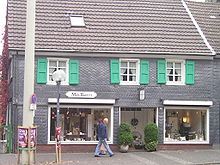Emil Barth (writer)
Emil Barth (born July 6, 1900 in Haan , Rhineland , † July 14, 1958 in Düsseldorf ) was a German writer .
Life
Emil Barth was born into a Silesian family of craftsmen. He was a younger brother of the painter Carl Josef Barth . After attending secondary school , Emil Barth worked as an employee in the printing and publishing industry; from 1924 he was a freelance writer . He lived in Munich from 1922 to 1932, and returned to Düsseldorf in 1932. After losing his Düsseldorf apartment in an air raid, he moved to Xanten in 1942 , and in 1943, after a short stay with his brother Carl in Mettingen, to his home town of Haan. In 1955 he returned to Düsseldorf again. Barth, who suffered from lung cancer in the last years of his life, died shortly after returning from a hospital stay in the USA in Düsseldorf, where his grave is located in the Nordfriedhof .
Emil Barth was the author of novels , short stories , essays and poetry . Strong during his narrative works autobiographical are colored, have his formal traditional poems mainly influences by authors such as Friedrich Hölderlin and Georg Trakl and treat again the topics transience and memory. The conservative but apolitical educated citizen Barth is considered a typical representative of the so-called “ inner emigration ” during the Third Reich .
Emil Barth was a member of the PEN Center of the Federal Republic of Germany and the German Academy for Language and Poetry in Darmstadt . In 1948 he received the Immermann Prize of the city of Düsseldorf, and in 1953 the Great Art Prize of the State of North Rhine-Westphalia . In 1956 he received the honorary gift of the Thomas Mann Foundation and the honorary gift of the Bavarian Literature Prize, and in 1957 the honorary gift of the Hermann Hesse Foundation. In Düsseldorf, Emil-Barth-Straße is named after him, in Haan the Emil-Barth-Realschule .
Works
- A sketch of the watchmaker's life, Hieronymus Rauch , Hamburg 1927, 1938
- Funeral celebration , Haan-Rhld. 1928
- Ex voto , Munich 1933
- The lost house , Hamburg / Leipzig 1936
- Georg Trakl , Mainz 1937
- Poems , Mainz 1938
- The Wandelstern , Hamburg 1939
- The Lorbeerufer , Hamburg 1942
- Greetings to Theo Champion , Düsseldorf 1947
- Lemuria , Hamburg 1947
- Enchantments , Duisburg 1947/1948
- Xanten hymns , Hamburg 1948
- Poems and poems in prose , Hattingen 1950
- Grandson of Odysseus , Hamburg 1951
- Nightshade , Bonn 1952
- Lines of Life , Bonn 1953
- At the temples of Paestum , Offenbach / M. 1955
- In the magic of Paris , Munich 1955
- Tiger mussel , Hamburg 1956
- Sea Magic , Giessen 1959
- Collected works in two volumes , Wiesbaden 1960
- Letters from 1939 to 1958 , Wiesbaden 1968
- Poetry , Mettmann 1990
- Mohn , Aachen 1993
- In the morning light of my eyes , Aachen 2000
Settings
- Removable frame . Six songs based on poems by Emil Barth (Black Muse / Der Schatten / Ihr Schwüre / Spruchband / Wechselrahmen / Heller als Glassteine) for high voice and piano, set to music by Ernst Krenek in 1964/65 as his Opus No. 189 (first performance 1965 in Düsseldorf).
literature
- Josef Ruland: Time as a substantive and formal problem in E. Barth's poetry , Bonn 1952.
- Georg Gusmann: Emil Barth's novel "Das Lorbeerufer" , Bonn 1953.
- Emil Barth , in: Internationales Biographisches Archiv 35/1958 of August 18, 1958, in the Munzinger archive ( beginning of article freely available)
- Bernhard Roßhoff : Memorial sheet for Emil Barth . In: home calendar of the Wesel district 1980, Wesel 1979, pp. 115–116.
- Joseph A. Kruse (Ed.): Emil Barth , Düsseldorf 1981.
- Joseph A. Kruse (ed.): The brothers Emil and Carl Barth , Düsseldorf 2000.
Web links
- Literature by and about Emil Barth in the catalog of the German National Library
| personal data | |
|---|---|
| SURNAME | Barth, Emil |
| BRIEF DESCRIPTION | German writer |
| DATE OF BIRTH | July 6, 1900 |
| PLACE OF BIRTH | Haan , Rheinland |
| DATE OF DEATH | July 14, 1958 |
| Place of death | Dusseldorf |
